What Is Sleep Apnea? – Eugene, OR
Symptoms,
Diagnosis,
& Treatments

Sleep apnea is a sneaky disorder largely because patients often go through life assuming they don’t have it, even if they do. When you go to bed like you normally do, but wake up feeling exhausted, you may find yourself pushing it off anyway or supplementing your grogginess with caffeine. While 25 million Americans are expected to deal with the symptoms of sleep apnea today, that number is only going up year after year. As a result, many patients ask us questions like “What is sleep apnea? What are the causes? Are there symptoms? Is treatment available?”
Better Sleep Eugene and Dr. Paskalev can not only provide answers for patients. They can also provide personalized sleep apnea treatment, turning difficult and tiresome days into ones filled with hope, energy, and optimism. Read on below to get the answer to the question, "What is sleep apnea?" from your Eugene sleep apnea doctor and learn more about how you can finally overcome it!
Sleep Apnea Basics
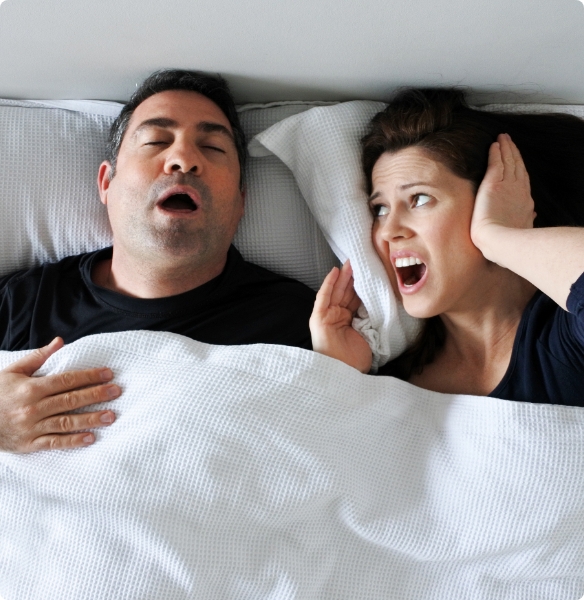
Simply put, sleep apnea is a disorder where a person can’t achieve deep sleep because of momentary lapses in breathing. These moments (or apneas) generally last about 10 seconds, but can happen hundreds of times per hour. This results in repeatedly interrupted sleep cycles, preventing people from getting the regenerative sleep they need to remain healthy and functional.
After breathing is interrupted, a few things begin to happen. At first, the body goes into panic mode, which makes blood pressure rise dramatically. Even after breathing goes back to normal and the person is awake, this spike can remain, increasing their risk for heart disease and stroke. Next, the body wakes up halfway so that normal breathing can occur. Many people don’t even realize all of this is happening, leaving them confused as to why they feel tired all the time.
What Causes Sleep Apnea?
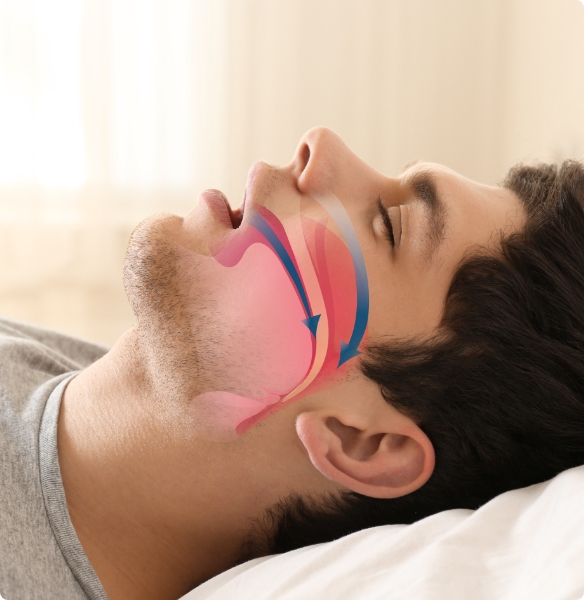
Sleep apnea comes in two main forms. This includes obstructive sleep apnea and central sleep apnea.
Obstructive Sleep Apnea (OSA) is far more common and occurs when soft oral tissues over-relax. This causes the airway to become blocked as a person sleeps. Keep in mind that if you have large tonsils or adenoids, a thick neck, or constantly stuffy nose, you’re more likely to develop conditions like OSA. Additionally, obesity is considered to be one of the leading preventable causes of OSA. This is due to fatty tissue surrounding the throat, making it more narrow and easier to close while asleep.
Central Sleep Apnea (CSA) is actually a neurological disorder where the brain cannot send the body the necessary signals to breathe during sleep. Heart and kidney failure, stroke, and drug use (particularly opiates) can lead to CSA, so it’s important to remain healthy or manage these conditions to reduce your risk for developing this chronic disorder.
Sleep Apnea Symptoms

If you are suffering from sleep apnea, you are far more likely to experience the following symptoms:
- Chronic daytime fatigue
- Loud snoring
- Gasping for air upon waking
- Sore throats and/or headaches every morning
- Sudden mood swings
- Bouts of depression
- Difficulty gaining or losing weight
- Struggling to concentrate or focus
- Hypertension
- Sexual dysfunction
How Is Sleep Apnea Diagnosed?
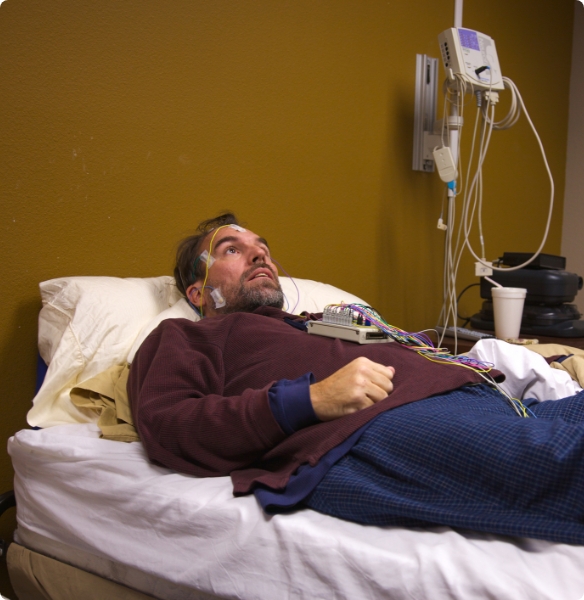
Since our sleep apnea dental office does not complete sleep testing ourselves, we refer patients to local sleep physicians or home sleep test services, like sleeptest.com, to have them completed. Both options ensure that you can receive a detailed diagnosis for your condition. The better we understand your symptoms and condition, the easier it will be to create a treatment plan that is fully personalized to you. If you have additional questions regarding the sleep test, feel free to let us know during your appointment!
Learn More About How is Sleep Apnea Diagnosed?
How Sleep Apnea Can Be Treated
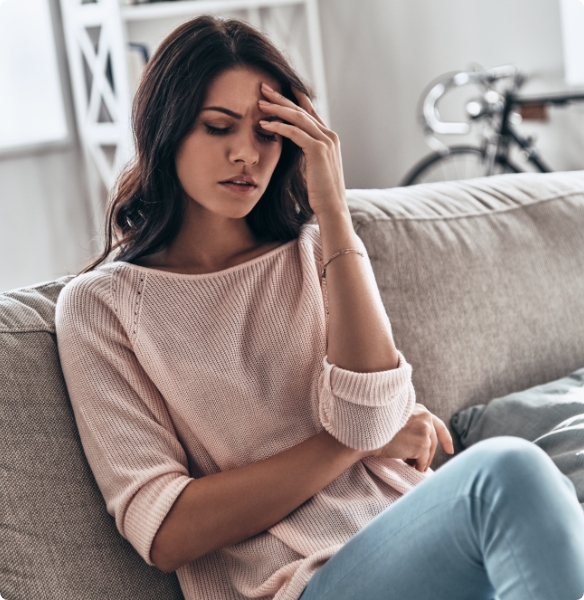
If you or someone you know is worried about potentially having sleep apnea, call a doctor as soon as possible. Our neighbors in Eugene are encouraged to complete a STOP-BANG assessment, allowing our team to evaluate and confirm the level of risk for the condition. If the assessment determines that it is likely that sleep apnea is present, an at-home sleep test will need to be completed. This test will allow professionals to monitor your breathing as you sleep. From there, a sleep doctor will examine the results and test so a detailed diagnosis can be developed.
If the patient does in fact have sleep apnea, the next step is determining the best way to have it treated. While CPAP therapy is among the most popular treatments today, many patients do tend to find it too uncomfortable to use because of the device’s large size and loud noise. This machine forces air into the patient’s mouth through a pump attached to a facial mask, which can also be claustrophobic for some.
Whether you have OSA or you find it impossible to use a CPAP, Dr. Paskalev can offer a solution known as an oral appliance (aka oral appliance therapy.) This device is similar to a small mouthguard that keeps the airway open and offers a much higher level of comfort and ease-of-use.
Snoring Is More Than Just Annoying
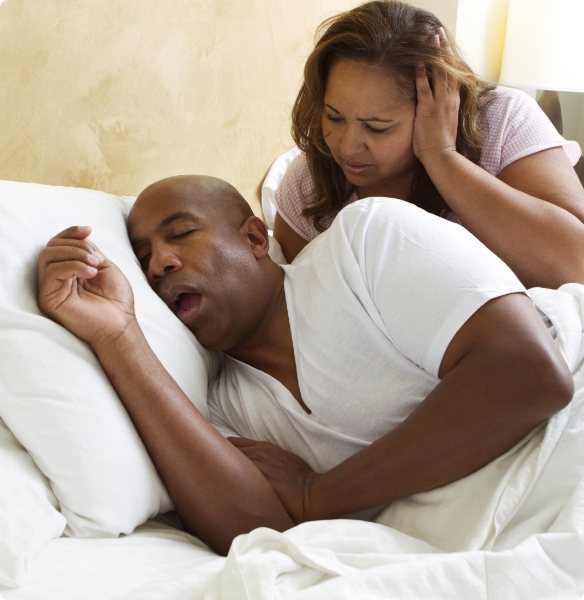
While you may feel tired every day due to sleep apnea, chronic snoring is another one of the most common symptoms you can experience. Many people assume it’s just another quirk of their family member or friend, but that doesn’t mean it should be ignored. Of course, snoring does not outright confirm that sleep apnea is present. With that said, snoring does indicate that you’re not getting as good a night’s sleep as you could be. Those who snore loudly are more likely to develop sleep apnea later in life. The good news is it’s possible to stop snoring with the help of an oral appliance. Devices like these not only improve sleep quality, but make it easier for those around them to sleep as well.
Is Sleep Apnea Treatment Covered by Insurance?

For most medical insurance plans, including Medicare and Medicare Advantage plans, you can expect coverage for someone who is in need of sleep apnea treatment. This remains true whether you receive an oral appliance or a CPAP machine. At Better Sleep Eugene, our team members are more than prepared to help patients discuss the details of their medical insurance plan, ensuring they can afford their oral appliance more easily.
Start Improving Your Sleep Today
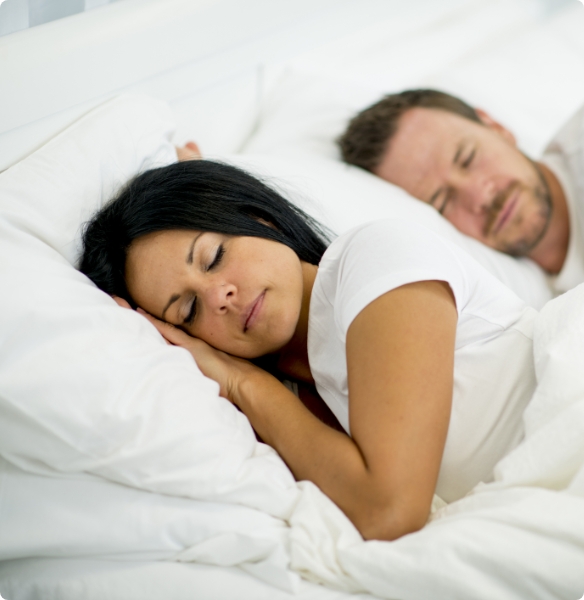
When it comes to both your short-term and long-term oral health, sleep apnea can have serious consequences. With effective treatment, which is readily available right here in Eugene, you can not only overcome your condition, but learn more about the disorder when you contact us today.
Sleep Apnea FAQs
Perhaps there’s something you want to know about the sleep apnea treatments that our practice offers, or maybe you have a few questions about the disorder yourself. We’re here to provide the answers you need to make fully informed decisions that will ultimately allow you to enjoy truly restful nights again. Before you reach out to us to schedule an appointment, check the FAQs below to see how we’ve responded to common sleep apnea inquiries.
Does Everyone Who Snores Have Sleep Apnea?
Snoring is very strongly associated with sleep apnea. However, that should not be taken to mean that everyone who snores is suffering from sleep-disordered breathing. Furthermore, it’s possible to have sleep apnea even if you don’t snore.
In short, snoring on its own is not enough to make a diagnosis. In order to determine for sure whether you have sleep apnea, Dr. Paskalev can review your medical history, perform a physical examination, rule out alternative explanations, and help you make arrangements to have a sleep study performed.
What Does Sleep Apnea Look Like for Women?
Sleep apnea is more common in men, but it’s possible for women to develop it as well. Generally speaking, women are more likely to suffer from sleep-disordered breathing if they are pregnant, postmenopausal, or overweight.
What’s important to note about sleep apnea in women is that it tends to cause different symptoms compared to men. Warning signs to watch out for include:
- Depression
- Anxiety
- Headaches
- Insomnia
- Waking up frequently during the night.
It’s essential to be aware of the kinds of sleep apnea symptoms that you are likely to suffer from; if you notice anything to be concerned about, you can seek the care you need in a timely manner.
Will My Sleep Apnea Go Away If I Lose Weight?
Being overweight can increase your risk of developing sleep apnea. This is due to an increased amount of tissue in the throat, which can potentially collapse and block the airway. Losing weight often means reducing the amount of tissue in this area, thus making it less likely that airway obstructions will occur.
That being said, there’s no guarantee that your sleep apnea will stop even after you have lost weight. A sleep study will need to be performed in order to determine whether you still have a sleep disorder.
How Should I Clean My Sleep Apnea Oral Appliance?
Harmful bacteria can accumulate on your oral appliance. As such, if you want to avoid oral health problems, you need to go out of your way to keep your appliance clean. When you take the appliance out in the morning, give it a thorough brushing and gently rinse away any saliva or food debris. You can also periodically soak the appliance in a denture cleanser. Whenever the appliance is not in its mouth, it should be stored safely away in its protective case.
Oral Appliance Therapy Types of Oral Appliances Combined Therapy What We Do

